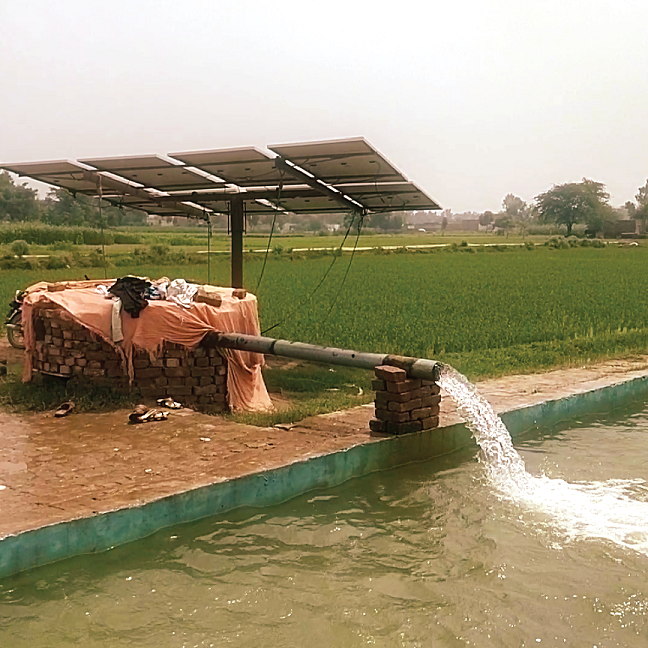Kalu Khan is a 40-year-old resident of the Umarwali settlement in the Bhakkar district. He owns a 6-acre agricultural plot. He had cultivated rice on four acres but incurred losses due to a lack of sufficient water for the crops.
Kalu Khan has installed a tube well (bore), which operates on a diesel engine, for irrigating his fields. He says that rice needs daily watering for a few weeks. After these initial weeks, it must be watered every alternate or third day; otherwise, the production gets poorly affected.
“Daily expenses for irrigating rice amount to ten to twelve thousand rupees because until some time ago, diesel was priced at 350 rupees per litre. The engine consumes two to three litres per hour. Irrigating two acres of crops becomes challenging if the tube well runs all day. Consequently, the crops did not receive adequate water, and the yield did not exceed 20 maunds per acre.”
In the Bhakkar district, agriculture is the primary source of livelihood for a significant population. However, in the past several years, rising electricity and diesel prices have become a problem for farmers, and small-scale farmers are most affected.
Most small-scale farmers do not have their tube wells, and they purchase water for their crops from others, which is quite expensive. For those who own tube wells, diesel expenses have become unbearable. This is why, in Bhakkar, most farmers have started transitioning their tube wells to solar energy.
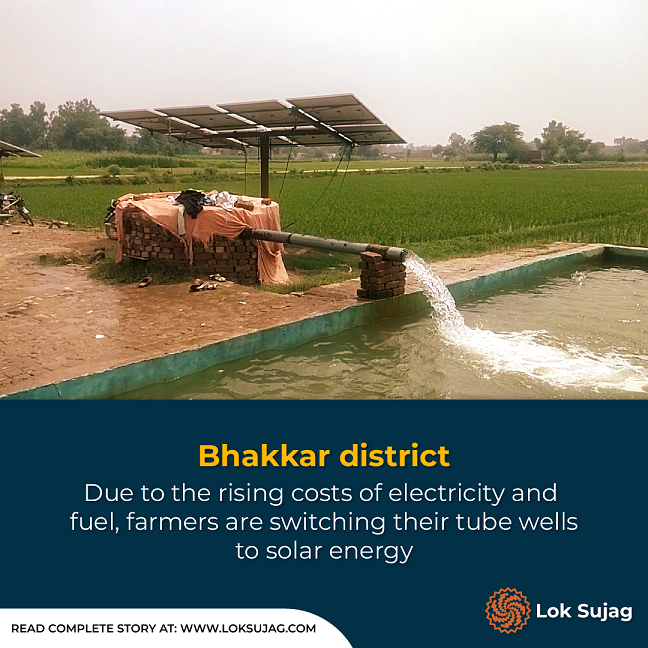
Most small-scale farmers do not have their tube wells, and they purchase water for their crops from others, which is quite expensive. For those who own tube wells, diesel expenses have become unbearable. This is why, in Bhakkar, most farmers have started transitioning their tube wells to solar energy.
Mulazim Hussain is also a resident of the Umarwali settlement. Unlike Kalu Khan, he has earned more than two hundred thousand rupees from his four-acre rice cultivation. He says he owns a five-acre plot and has leased out fifteen acres.
"Initially, not only were the profits lacking, but even the cost of cultivation was not fully covered. However, since the tube well has been shifted to solar power, I have expanded my cultivation to 10 acres alongside rice because water is abundant. The rice yield has been excellent this time, and the sugarcane crop is also good."
Mulazim Hussain is pleased. He says that although a significant amount had to be spent to shift the tube well to a solar system, unlike electricity, there is no hefty bill to pay every month. Now, there is no hassle of buying diesel or the expense of engine maintenance. He has now been relieved of all these troubles.
Abid Hussain is the owner of a 120-acre agricultural plot. He had four tube wells installed in his land that operated on diesel engines.
He says that five years ago, he shifted two tube wells to electricity, which led him into repeated troubles. Firstly, electricity became expensive day by day, and on top of that, load shedding caused inconvenience. When needed urgently, he had to resort to using the old diesel engines again.
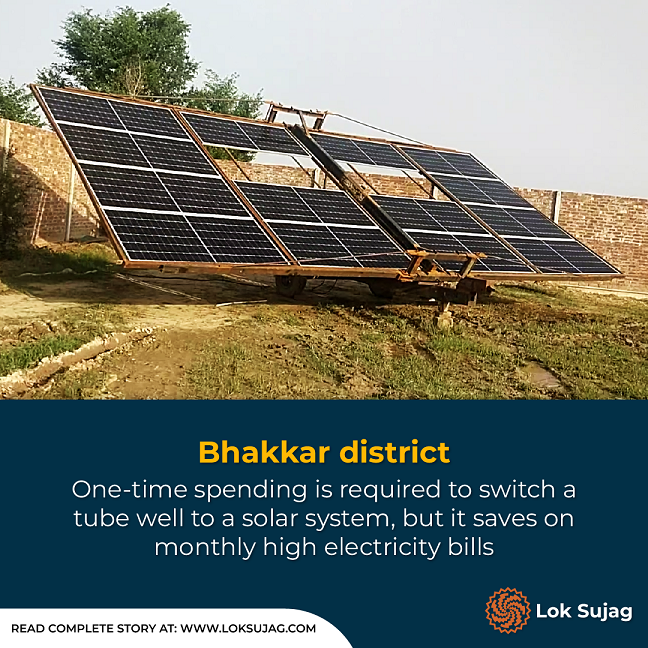
“When a friend advised me to install a solar system, I decided to experiment. Last year, I shifted one tube well to solar power, incurring an expense of 22 lakh rupees because, at that time, the rates for solar panels were high. I have also decided to move the remaining three tube wells to the solar system.”
The landlords of the Bakhtawar settlement, including Mazhar Hussain Dhandla, say that some landowners with more than 50 acres of land began operating tube wells on solar power back in 2012. However, now, there is an increasing trend towards installing solar panels.
He says that due to expensive water, struggling farmers observe each other and install solar systems. However, at the government level, no assistance or guidance is being provided to farmers. The government should consider providing subsidies or interest-free loans for installing solar tube wells so that the difficulties of small-scale farmers can be reduced.
He said that under the previous government's Prime Minister Youth Program, an announcement was made to provide seven per cent interest agricultural loans to educated youth with at least seventy per cent marks. This program included solar tube wells as well. However, private banks set conditions so ordinary farmers couldn't avail of this facility.
In this regard, Dr Imtiaz Hussain, the district officer for the National Program for Improvement of Water Management, says that their department is providing a 75 per cent subsidy on drip irrigation and sprinkler systems with solar energy for small-scale farmers.
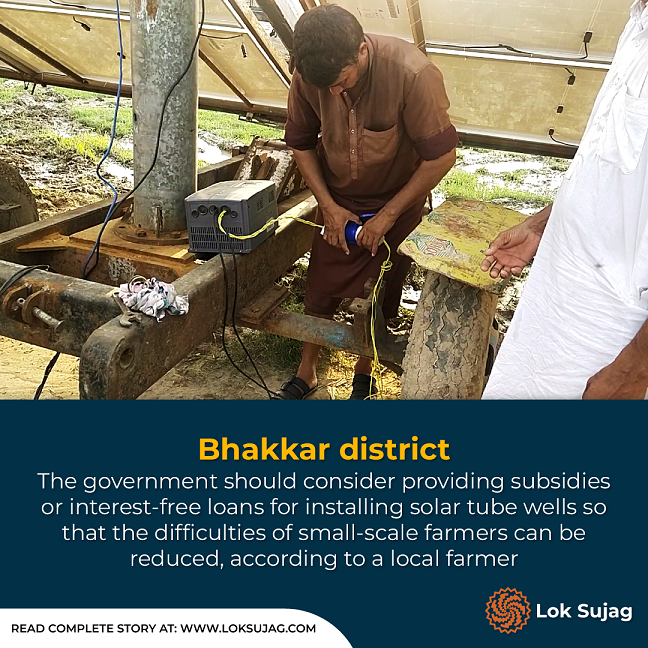
"Our program's primary objective is to conserve underground water resources, so we do not provide subsidies on solar tube wells to those farmers who are not interested in drip irrigation or sprinkler systems."
Wajid Hussain is a resident of Basti Girah. He abandoned farming two years ago because he had to buy water for his crops from a nearby landowner at 600 rupees per hour. When the electricity rates increased further, he found it more reasonable to quit farming.
He says that a year and a half ago, a dear one in his settlement started operating his tube well on solar power, and he found this experience extremely beneficial.
"I talked to my brothers because the issue was that we only have two acres of land, and the expenses for solar were too high for such a small area. If we lease the land, the solar panels might be stolen. Upon this, a shopkeeper suggested installing a solar system on a trailer."
He says that he has installed a solar system on a trailer, and by leasing a ten-acre plot, he has resumed farming.
Also Read
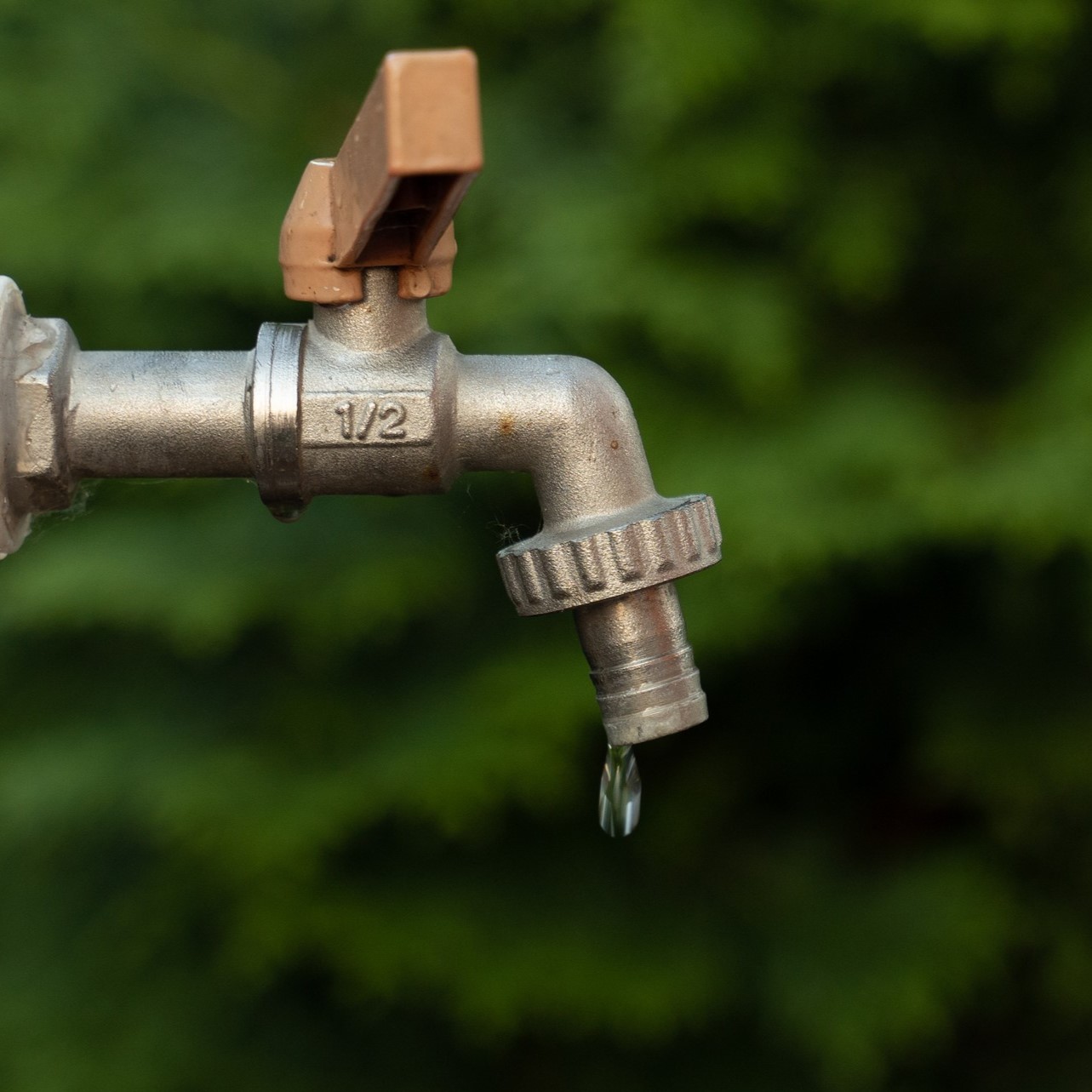
Thirst for justice: Thar’s solar RO dream dries up, leaving communities parched
"My land and the leased area are in different directions, but both places have a bore, so there is no problem. Where water needs to be provided, solar panels are taken there using a tractor and brought back home at night."
Mazhar Hussain Dhandla expresses concern that although farmers are installing solar systems, it is uncertain whether these systems will last for the duration of the warranty.
The company's representative selling solar systems in Bhakkar, Syed Ali Abid Bukhari, informed Lok Sujag that after canal water, the cheapest means of irrigation is a solar system, which can be used for 25 years once installed.
He says the rates for solar panels and related equipment increased due to difficulties with the dollar and imports last year. Six months ago, a 6-inch diameter water discharge tube well's solar system was installed for 22 to 23 lakh rupees. It is now installed for 14 to 15 lakh rupees with the same system, materials, and a 25-year warranty.
He says that if you run a tube well for an average of five hours daily, the amount spent on installing a solar system on the tube well is recovered within a year, considering the current diesel rates. Moreover, for the remaining 24 years, you get water for your crops for free. This is contingent on selecting the right quality and a good-performing solar system.
Published on 25 Jan 2024
